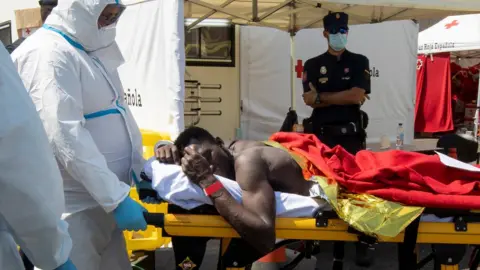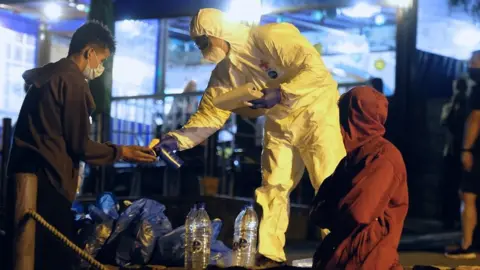Spain's Canary Islands see new influx of African migrants
 EPA
EPAMore than 1,000 migrants from Africa have arrived in the Spanish Canary Islands over the last 48 hours, the Red Cross says.
These are figures that have not been seen for more than a decade.
On a visit to the islands, Spain's Migration Minister José Luis Escrivá promised a "comprehensive response".
This route from West Africa has grown in popularity since 2018. A previous peak, in 2006, saw 35,000 migrants arrive in the archipelago, the UN says.
Many of the migrants would have set sail from Senegal, more than 1,600km (1,000 miles) away, where this week two boats carrying 186 people were intercepted by Senegalese marines, the AFP news agency reported quoting a military statement.

The passengers were reported to have been from Senegal and The Gambia.
The migrants who arrived in the Canary Islands since Thursday were rescued from 37 boats, Spanish news agency EFE reports.
Many are being looked after by the Spanish Red Cross in camps near where they disembarked.
A Red Cross spokesman told AFP that barring a few mild cases of hypothermia, all were in good health and had been tested for coronavirus.
 EPA
EPAMr Escrivá has been on a trip to three of the archipelago's main islands - Tenerife, Fuerteventura and Gran Canaria - to see the situation for himself.
But he was criticised by local council leader Blas Acosta for not offering any solutions to how the migrants should be housed, El Mundo newspaper reports.
Between January and the end of July this year, 3,269 migrants made the crossing from West Africa to the Canary Islands, which is nearly a 600% increase on the same period in 2019, the UN's International Organization for Migration (IOM) says.
This year so far, more than 250 people have died trying to reach the islands, the IOM adds.
